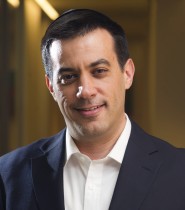
Naomi Frankel
“Starting a business idea is 5 % inspiration, 95 % perspiration,” says Shraga Zaltzman, CEO of Work Avenue.
Indeed, Zaltzman and his team have worked incredibly hard to make Work Avenue the successful enterprise it is today.
Work Avenue, formerly known as TrainE/TraidE, is a charity operating primarily across the Jewish community. It assists people in creating long term sustainable incomes either through creating employment or building business.
As soon as I walk into Work Avenue, I am impressed with the state of the art modern building. It is well lit, bright and positively buzzing with life. Mr Zaltzman tells me that my reaction is exactly what Work Avenue aims for.
“We want our building to embody who we are – a place of aspiration. The largest battle in setting yourself up or getting a job is getting over that hurdle of confidence. We want to inspire people’s confidence as soon as they walk through the door.”
When he joined in 2007, Zaltzman helped build up the team and the services offered to include supporting new small businesses.
“The original idea was to provide training opportunities for women in the community, but we soon realised there was an equal demand for men too and for those interested in starting their own businesses.”
It is important to base the lifeblood of your business on strong ethics. Work Avenue takes inspiration directly from Maimonides.
“We believe that the highest form of charity is to help somebody to help themselves. This should be the cornerstone of any community, particularly the Jewish community.”
Work Avenue embodies this with its two bustling departments. The employment department deals with supporting individuals all the way to employment.
This includes careers guidance sessions, CV workshops and interview skills. Within this department lie many programs, such as a successful internship program which places 180 people annually into jobs.
Mr Zaltzman also tells me about a program called “back to work for women,” amongst many others. Work Avenue also has an exciting new venture launching in June-Kick CIC (coders in community). This aims to educate and employ Orthodox people in the community to become computer programmers, for which there is a growing need.
“There are those who have all the capabilities but not the tools to go forward. We have teamed up with employers to get people into jobs, and essentially, we are driven by this end goal in all that we do.”
Mr Zaltzman tells me that when looking to set up a business/organisation, it is crucial to look for what the market is demanding.
“If you’re answering a need already out there, you’re onto a winner,” he says. “We feel that there’s a huge potential in our community to start their own businesses and really succeed.”
The business side of Work Avenue certainly aims to do this, answering the growing need in the community for help with starting up their own successful businesses.
The team, headed by Debbie Sheldon, helps get new businesses going by giving advice and helping with business plans and cash flows. They work in conjunction with the government’s start-up loan scheme to deliver micro loans to small businesses and “to date have lent one and a quarter million pounds in government money.”
Another facet of a successful business is constantly adapting according to what needs to be improved or altered.
“We still have an entrepreneurial spirit,” Mr Zaltzman says emphatically.
This can be seen through the adaptation of the mentor service Work Avenue provides to businesses. Each business has a mentor who has expertise in the business service they operate. However, Mr Zaltzman relates that “it soon became apparent that a business has so many issues to deal with, one mentor couldn’t possibly know enough to deal with everything.”
Therefore, Work Avenue “turned the model on its head” and started to focus on building a human capital business network to help businesses get going, which was a “roaring success.”
The power of people is often underestimated in business but Mr Zaltzman strongly believes that opportunities are connected to people. This was the thought process behind WE HUB, a space where people work and collaborate together.
“It is clear that the more people are brought together to collaborate, the more opportunities are created.”
Some may think that the key to succeeding in the business world is education, but Mr Zaltzman thinks differently.
“Although it’s important to have a business degree, it isn’t a ticket to success. Be undeterred in your ambition for achievement and you will go far.” Mr Zaltzman regards what he does “as a passion, not a job,” and believes this drives him to succeed. “I work hard because I love that satisfaction I get from helping people towards earning a living. This is because the outcome affects not only them, but their whole family and community.”
The most challenging part of his job he says, is “seeing people in difficult situations and not being able to help people as fast as they would like.” In terms of his own family life, Mr Zaltzman admits his long hours can be difficult, but “when I get up and go to work, my family know I’m going to help people and I think this is the ultimate chinuch I give to my children.”
In June 2016, Mr Zaltzman’s exemplary care and dedication saw him awarded with an MBE from the Queen for services for employment and enterprise in the Jewish community. “It was a true honour for the whole team and community at large. We hope that this serves as an example for other communities.”








